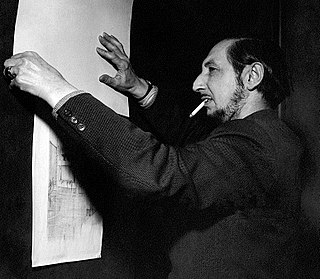
Carlo Scarpa was an Italian architect, influenced by the materials, landscape and the history of Venetian culture, and by Japan. Scarpa translated his interests in history, regionalism, invention, and the techniques of the artist and craftsman into ingenious glass and furniture design.

Pietro Longhi was a Venetian painter of contemporary genre scenes of life.

Lorenzo di Credi was an Italian Renaissance painter and sculptor best known for his paintings of religious subjects. He is most famous for having worked in the studio of Andrea del Verrocchio at the same time as the young Leonardo da Vinci.

The Pinacoteca di Brera is the main public gallery for paintings in Milan, Italy. It contains one of the foremost collections of Italian paintings from the 13th to the 20th century, an outgrowth of the cultural program of the Brera Academy, which shares the site in the Palazzo Brera.
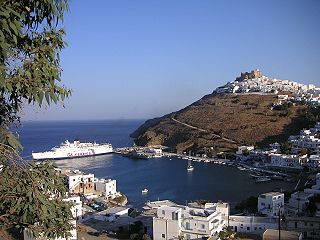
Astypalaia, is a Greek island with 1,334 residents. It belongs to the Dodecanese, an archipelago of fifteen major islands in the southeastern Aegean Sea.
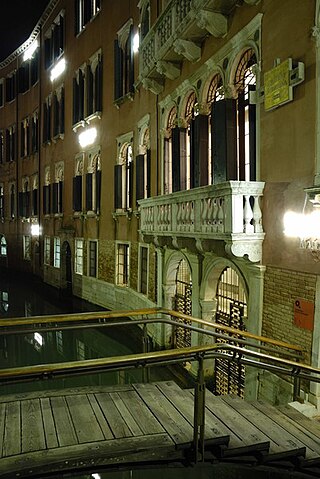
The Fondazione Querini Stampalia is a cultural institution in Venice, Italy, founded in 1869 at the behest of the last descendant of the Venetian Querini Stampalia family, Conte Giovanni Querini. Architect Carlo Scarpa designed interior, exterior, and garden elements and spaces on the ground floor of the historic building.

Palazzo Madama e Casaforte degli Acaja is a palace in Turin, Piedmont. It was the first Senate of the Kingdom of Italy, and takes its traditional name from the embellishments it received under two queens (madama) of the House of Savoy.
There are several entries linked with the family name of Querini Stampalia, a branch of the Querini:

Luigi De Giudici was an Italian painter of the Venetian anti-academic movement in the first years of the twentieth century. His works were exhibited at Ca' Pesaro between 1912 and 1920 and at the International Exposition of Paris (1937).

The Ateneo Veneto di Scienze, Lettere ed Arti is an institution for the promulgation of science, literature, art and culture in all forms, in the exclusive interest of promoting social solidarity, located in Venice, northern Italy. The Ateneo Veneto is made up of 300 members resident in the city and in the province of Venice, elected by the Assembly, which is also responsible for appointing the Chairman and the Academic Council. Honorary, Non-Resident and Foreign Members, elected by the Assembly also participate in the life of the Ateneo.
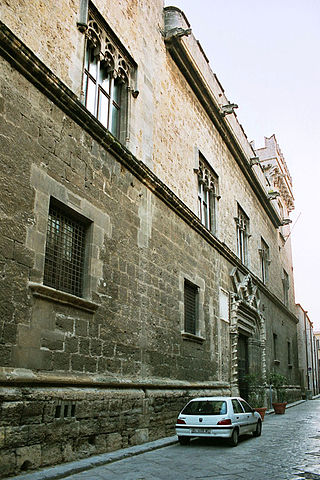
Palazzo Abatellis is a palazzo in Palermo, Sicily, southern Italy, located in the Kalsa quarter. It is home to the Galleria Regionale della Sicilia, the Gallery of Art for the Sicilian region.

Eugenio Da Venezia was an Italian painter. He was a member of the group known as I Giovani di Palazzo Carminati. This group rejected the prevailing style of the Italian Academy at the beginning of the 20th century. Da Venezia painted in a post-impressionist style, influenced by the Venetian tradition of the vedutisti. He exhibited in ten editions of Venice Biennale between 1934 and 1956, including the XL anniversary in 1935.

Gabriele Bella (1730-1799) was an Italian Baroque painter.

The Palazzo Pepoli Campogrande, also known as Palazzo Pepoli Nuovo, is a Baroque style palace on Via Castiglione 7 in central Bologna, region of Emilia-Romagna, Italy. In 2015, it served as a public art gallery for late-Baroque art. Across the Via, rises the medieval Palazzo Pepoli Vecchio, also once pertaining to the same family, which now serves as a museum of the history of Bologna.
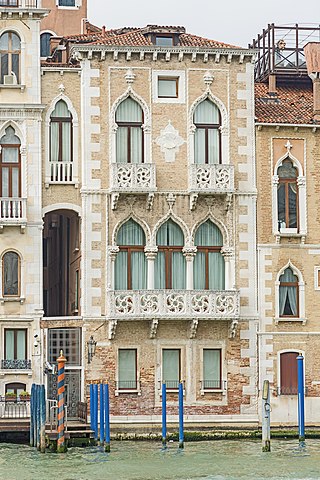
Palazzo Contarini Fasan is a small Gothic palace in Venice, Italy, located in the San Marco district and overlooking the Grand Canal. The palazzo is also called the House of Desdemona.
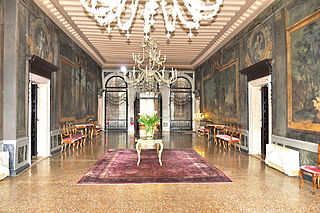
Portego is a characteristic compositional element of the Venetian civil buildings built during the years of the Republic of Venice. The portego is similar to a reception hall but has peculiar features.
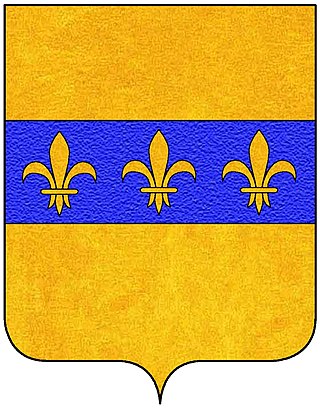
The Querini or Quirini were a Venetian patrician family. They claimed an ancient Roman heritage, but their traceable history goes back to the 11th century. The family divided into many branches.


























